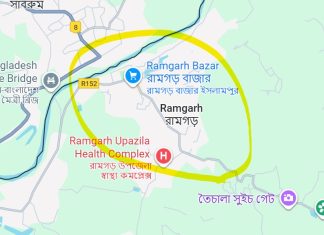Commentary Report
Today, a candle-lighting vigil will be held in memory of Akhraw Marma, Athuipru Marma and Theiching Marma who were martyred in a military–settler attack in Guimara, Khagrachari. At the call of a newly formed organization of martyr families called the Shaheed Smriti Sangrakshan Sangshad, this program is being observed across the Chittagong Hill Tracts and in Dhaka, Chattogram and Rajshahi.
On 28 September, while peacefully enforcing a road blockade called in protest against the rape of a Marma teenage girl, members of the army opened indiscriminate fire and the three young men lost their lives. It is known, however, that Akhraw Marma did not die instantly at the scene. After he was shot in the leg, army personnel took him away and, instead of sending him to a hospital for treatment, subjected him to unspeakable physical torture. As a result, while in army custody he died from excessive blood loss and the torture.
A month has passed since the army–settler attack on the Marma-dominated Ramesu Bazaar in Guimara. Yet no one who carried out the attack, looting and killings has been arrested. The police merely filed a case naming unknown persons, and did nothing more than that. Even though the perpetrators are identified, they have not been arrested.
Meanwhile, the soldiers and settlers involved in the attack are desperately trying to cover up their crimes and shift the blame onto others. They have started a vicious campaign of slander against the UPDF. The breadth of their lies is astonishing. The government, administration, state apparatus and media are all on the side of the murderous soldiers and settlers. Therefore it can be said with certainty that, like previous attacks, the Guimara attack will go unpunished and the perpetrators will not be held accountable.
In fact, all colonial regimes in the world share the same character. The colonized receive no justice. By contrast, members of the ruling nation escape accountability even after committing heinous crimes. Shashi Tharoor — a senior leader of India’s Congress party and former Under-Secretary-General of the United Nations — in his book An Era of Darkness: The British Empire in India, describes the true face of rule of law under British colonial rule in India. There is no difference between his description and the present rule of law in the Chittagong Hill Tracts. Because of the direct military occupation, the rule of law in the Hill Tracts is a hundred times worse than under British rule.
Tharoor, in one passage of the book, recounts that when two British officers, Lieutenant Thompson and Neave, shot and killed an Indian boy in Bangalore, the local villagers forcibly took Neve’s gun away. Two of the villagers were then punished: they received six months’ imprisonment for the crime of misappropriating the white man’s weapon. The killers received no punishment. The case was framed as an “attack by natives against Europeans.”
In the same book Tharoor mentions another striking incident. In 1902 in Sialkot three soldiers of the 9th Lancers physically tortured and killed an Indian because he had refused to provide women for them that night. Authorities carried out no investigation; they tried to cover the crime by calling the deceased a drunkard and protecting the perpetrators. The incident angered the then-Viceroy Lord Curzon and many Britons living in India. Still, Lord Curzon was unable to increase the punishment of the killers of the “damned nigger.”
This British colonial mindset is one hundred per cent prevalent among the Bengali rulers in the Chittagong Hill Tracts. That is why, under the military occupation and settler colonialism in the Hills, it is futile to expect justice for the hill peoples. Army members and settlers commit murder, genocide, rape, forcible seizure of others’ property, looting and other heinous crimes, yet in the courts they are never punished. They are not even arrested. On the contrary, the Hill people — the victims — are oppressed. They are portrayed as terrorists and criminals. Even seeking justice is treated as insolence. Their homes are searched, they are harassed, beaten, arrested without cause and sent to prison.
Until the military occupation and settler colonialism in the Hills end, no change in this situation can be expected. Only through relentless struggle can this change be achieved. It should be remembered that injustice is never permanent. British rule in India ended through struggle. Likewise, through struggle one day the military occupation and settler colonialism in the Chittagong Hill Tracts will also end.
(30 October 2025)
————










